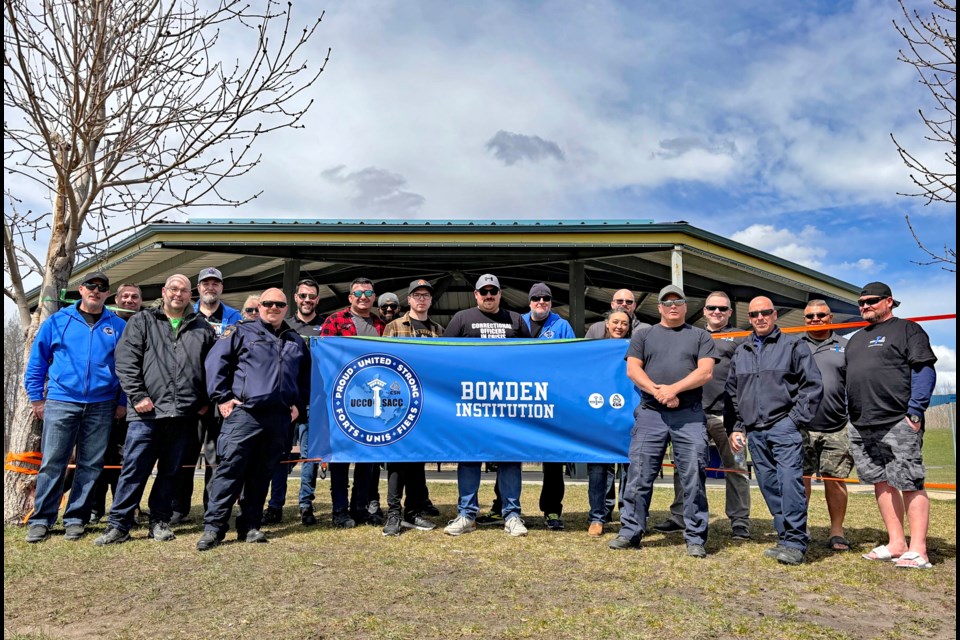Scores of Bowden Institution staff members, including guards and nurses, held a rally this week to protest the implementation of a new Prison Needle Exchange Program (PNEP) they say will endanger their lives and adversely impact citizens in the surrounding communities.
“Everybody that is near will be affected by it at some point,” said Jeremey Doucette, president of the Union of Canadian Correctional Officers (UCCO) Bowden that represents 302 correctional officers at the 704-inmate Bowden Institution, a medium security prison. “The communities will be affected by these needles, and people coming in for visits with children and these offenders could have needles on them.”
However, Correctional Service Canada (CSC) is taking a different view.
After being contacted by the Albertan, a CSC regional communications manager said in an email the agency was “unable to accommodate” an interview request but a statement was provided.
“The safety and well-being of our staff are of paramount importance for CSC. We are, and will continue, to work with our staff and union partners to ensure safe work environments,” said the email. “Several measures are in place to protect the safety and security of staff. Front-line correctional officers are qualified to use, and are provided with, the necessary security equipment to ensure their safety and security in institutions, including protective vests, self-defence tools, and restraint equipment.”
The CSC statement also noted there have been no reported assaults on employees or incarcerated offenders involving needles used in the PNEP program.
The UCCO rally on April 29 in Innisfail featured a public barbecue and union members handing out flyers to people passing by explaining why workers at Bowden Institution opposed the needle exchange program, which was first implemented by CSC in June of 2018.
According to CSC, Bowden Institution is now one of 11 federal prisons at 12 locations across Canada where the PNEP has been implemented. In Alberta, only Bowden and Edmonton Institution for Women have the program.
Doucette noted April 29 was the first day of CSC’s implementation of the PNEP program at Bowden Institution, which he added was first considered by the federal agency back in 2020 but delayed by the COVID-19 pandemic.
For the past four years, said Doucette, the union has been vehemently against the initiative, countering there are real dangers for correctional officers, nurses, other inmates, and even for citizens in the surrounding communities.
Doucette noted inmates are not allowed to use drugs at the institution but are still given needles, which, he added, can easily be turned into weapons.
He said staff members have no defensive equipment as their gloves are not rated for the gauge of needles used.
“We keep being told (equipment and gloves) are coming. They're ordered,” said Doucette. “We've been being told this for three years now, and we haven't received a thing.
“Our nurses don’t want this. They're being forced to hand these (needles) out to the cons for privacy,” he added. “We are not technically supposed to know who has them so they can trade them away. They'll use them as currency at the prison to make money and sell them to cons or rent them out to other inmates.”
Doucette added that “nine times out of 10” inmates will hide from the guards when injecting the drugs, and if they overdose it could be too late.
“Most times we do save them in time but the biggest issue that Corrections Canada is dealing with is they'll do them in private,” he said. “(Inmates) will hide it away from us because they know they're not supposed to, and then by the time we get to them it could be too late.”
He said the PNEP issue is also a contentious one in the union’s ongoing talks for a new collection agreement, as the old one expired three years ago.
“We're trying to hash out all these issues that we're having with the prison needle exchange,” said Doucette. “Some jails have a safe injection site where they can actually go in front of a nurse and do drugs. That is what we would prefer at the jail.
“It is not a better term but is safer for the inmate and safer for the nurse and safer for us because they are isolated in a room where we can watch them,” he added. “That’s what we have been pushing at Bowden.
“We would prefer none of them but the safer option for everybody is an actual safe injection site and Drumheller right now is doing one and it's going great.”



